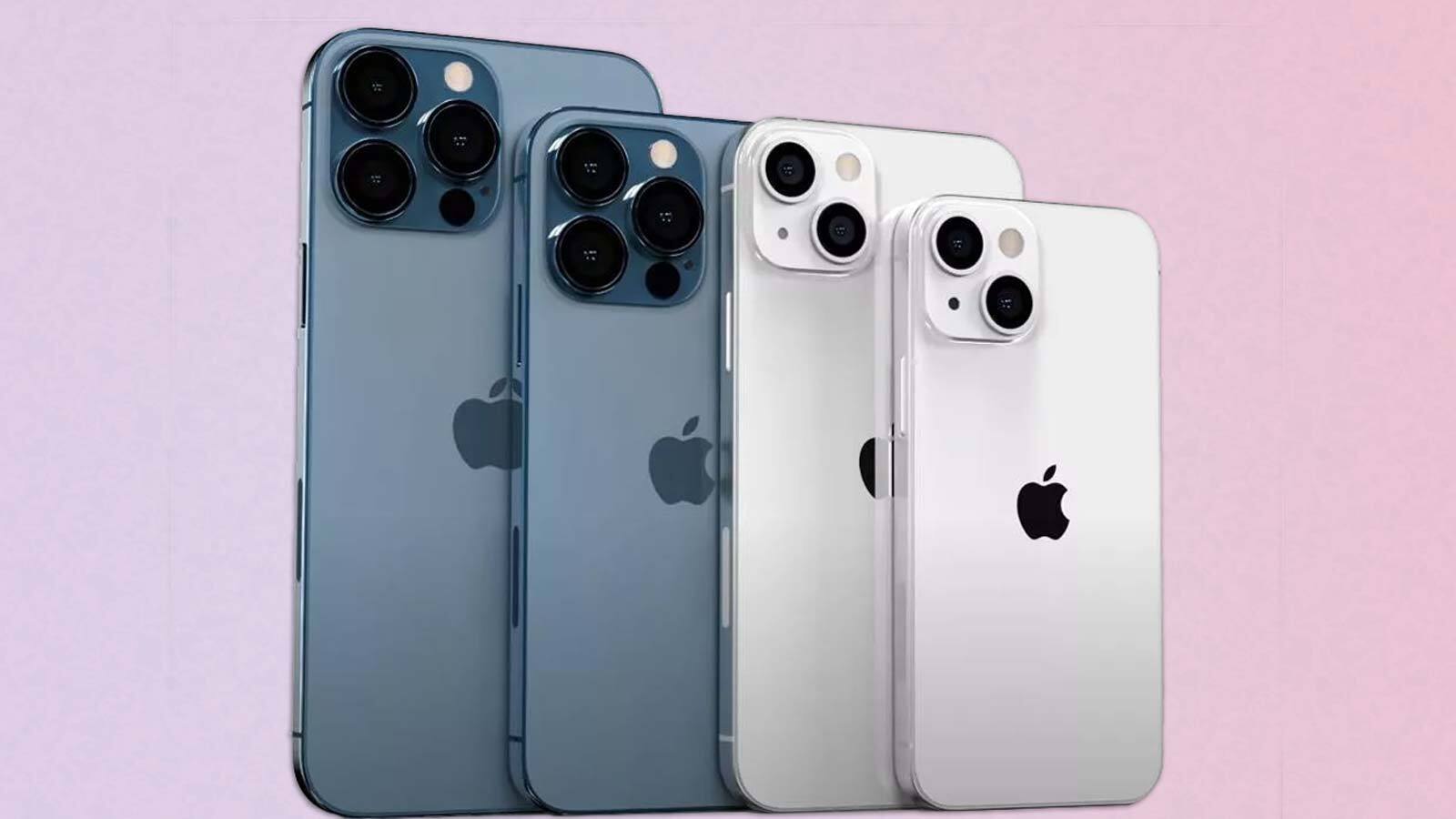
In the years past, companies would rely on their phone's cameras or fast processors as the main selling points. This year, AI-powered features have taken center stage, with Google and Samsung already reaping the benefit of being early adopters. In a quest to not be left behind, Apple will reportedly also bring AI features to the iPhone 16. This may require the company to increase the RAM count.
Apple can be quite stingy when it comes to RAM and storage. Why else would it be proud of equipping base models of its pricey phones with only 128GB of storage?
In late December, a company reported that Apple's new phones may have the same amount of RAM as the existing handsets, meaning 6GB for the base and Plus models, and 8GB for the Pro variants. This was despite the fact that some experts thought that phones with on-device AI would require as much as 20GB of RAM for reliably executing image generation and assistant functions.
The report was later contradicted by a report that said the iPhone 16 and 16 Plus would have more RAM.
Apple might need to equip the iPhone 16 with more RAM and storage than the iPhone 15 whether it wants to or not
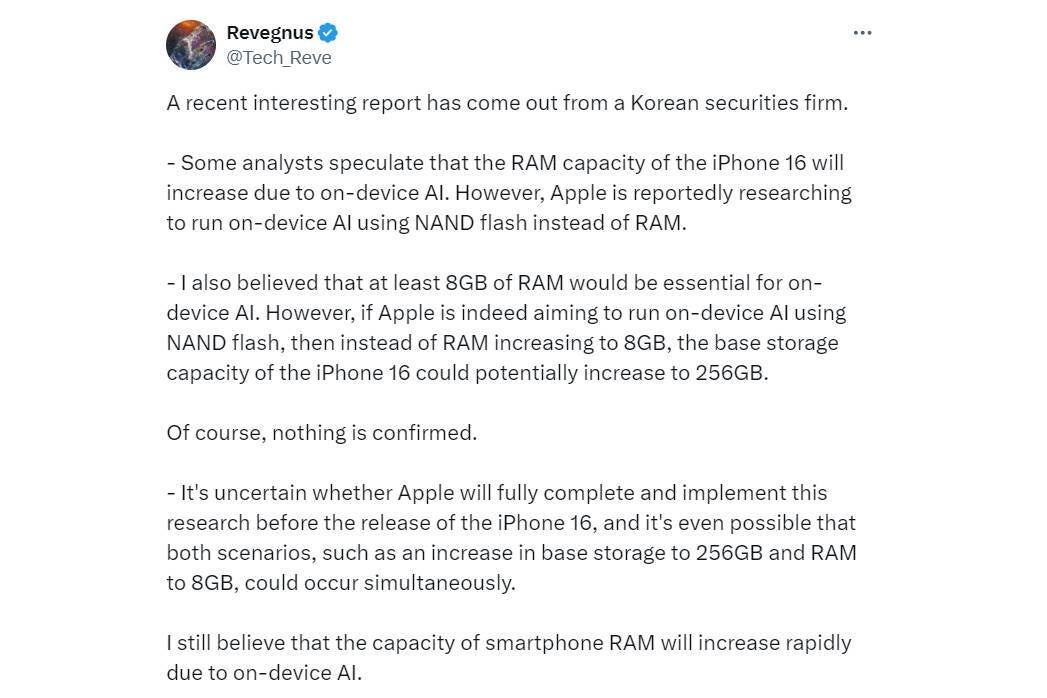
Leaker @Tech_Reve has now shared the findings of a report from a Korean securities firm that suggest iPhone 16 will have more RAM to keep up with the demands of on-device AI.
Alternatively, Apple may equip the new phones with more NAND flash, so baseline storage may increase to 256GB. That's because AI models rely on data generated by various components of a device, such as swipes, cameras, and sensors, so more storage will be required to feed more data to them.
Apple might also end up boosting both storage and RAM, so 8GB of RAM and 256GB of storage might be standard across the entire lineup.
Samsung also increased base RAM from 8GB to 12GB on the Galaxy S24 Ultra this year and the Pixel 8 Pro starts with more RAM than the Pixel 7 Pro.
If data centers will be doing the heavy lifting, does the iPhone 16 really need more RAM or storage?
As an aside, many of Galaxy S24 and Pixel 8's AI features are powered by the cloud, so if Apple takes this route, the iPhone 16 might not really need a RAM or storage bump. Recent reports say that the company is in talks with ChatGPT's OpenAI, Google, and China's Baidu to bring AI features to the iPhone 16. The company apparently thinks its large language model needs more work, which is why it's ready to swallow its pride and ask other companies for help.
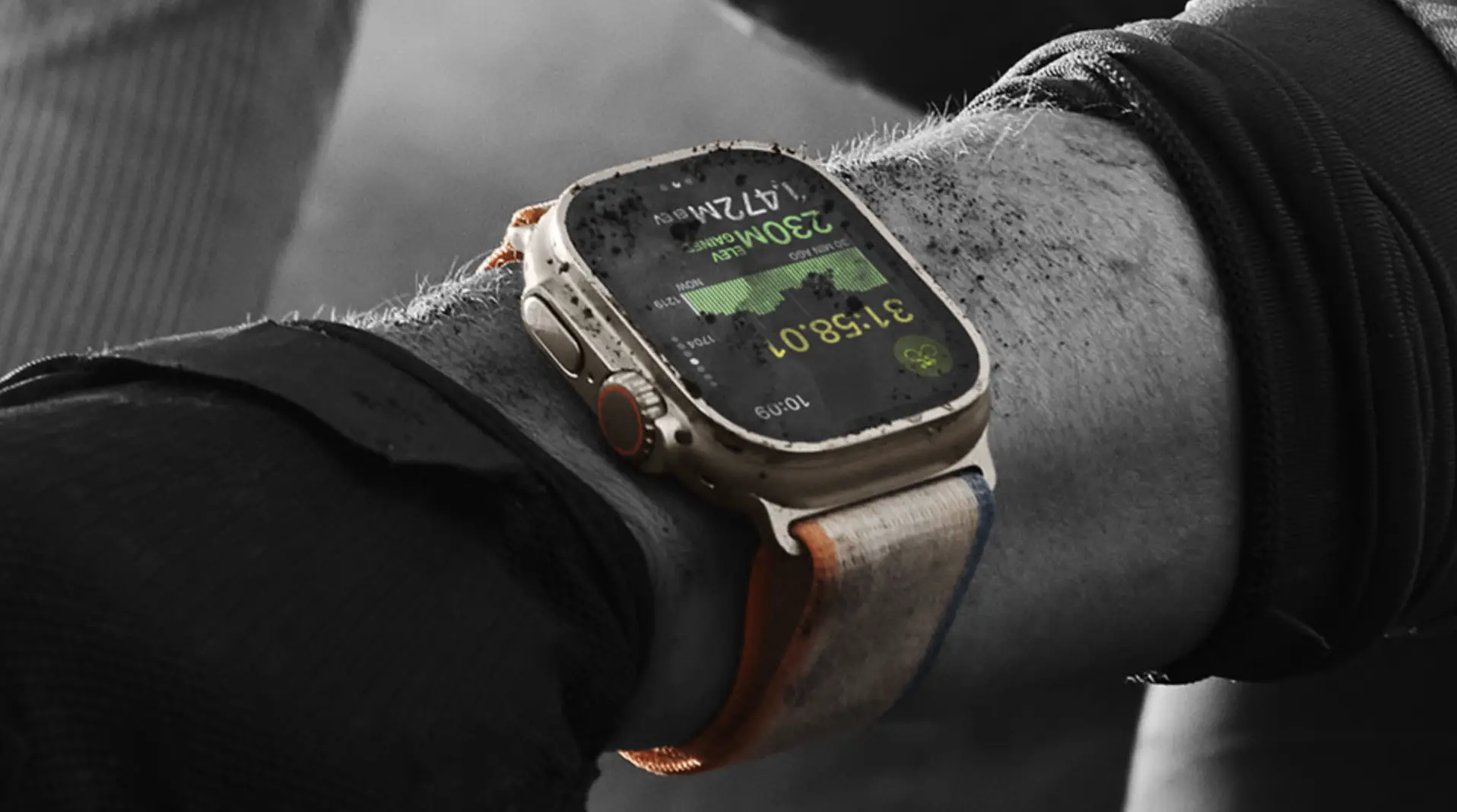
Apple's famed walled garden approach means that most of its products and services are catered towards its ecosystem. The Apple Watch is a good example where it pretty much only works with the iPhone and not Android devices. But it turns out that Apple did initially try to include support for Android.
This was revealed during Apple's response to the US DOJ lawsuit. The lawsuit gave an example of how the Apple Watch is only compatible with the iPhone. This in turn would essentially lock users to the Apple ecosystem as it would be costly for customers to have to ditch their Apple Watch if they were to switch to Android. Additional costs would be incurred if they had to buy a new smartwatch.
In response to that statement, Apple claims that at one point in time, they were working on Android compatibility. It seems that the company spent three years trying to make the Apple Watch work with Android. Due to technical limitations, those plans were ultimately scrapped, leaving us where we are right now.
There is no doubt that the Apple Watch would have a much greater reach had it been compatible with Android. For all we know, it could have even swayed Android users over to the iPhone. In any case, Android users have a lot of alternatives to choose from so maybe it's not that big of a loss for them.
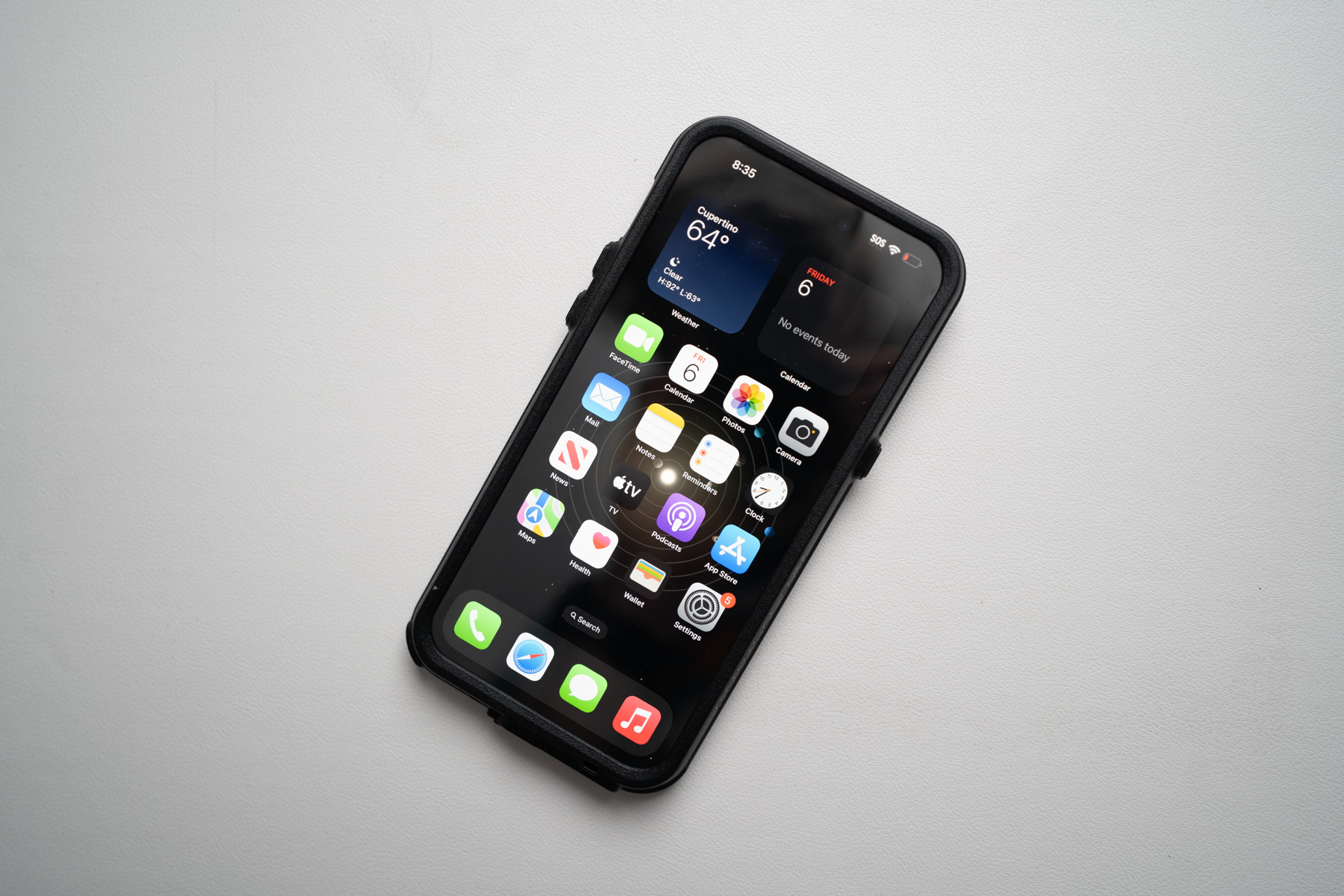
From pretty much the inception of iOS and the iPhone, Apple has only ever allowed users to download apps from the App Store. Unlike Android, Apple does not allow the installation of third-party app stores. That has finally changed in the latest iOS 17.4 update which will allow iPhone users to install and use third-party app stores.
For those unfamiliar, this is thanks to the EU's DMA. This new law basically forces Apple to open up iOS to third-party app stores, among other things. While it is a welcome change, Apple still appears to be holding onto the leash somewhat tightly.
For starters, these third-party app stores need to be approved by Apple. Users then need to give it explicit permission to download apps on your phone. These apps will also need to be "notarized" by Apple and be scanned for malware. Apple is also making changes to how payments work.
Overall, it seems that developers will now have an option if they do not wish to use Apple's App Store. It is also a win for developers. It remains to be seen, however, if customers will be willing to make the switch. Apple has largely done a good job of ensuring apps from its own App Store are safe.
Now it will be up to developers and third-party app stores to convince iPhone customers to step outside Apple's walled garden. Keep in mind that these changes only apply to the EU. It does not appear that Apple has plans to expand this feature to other markets (yet).
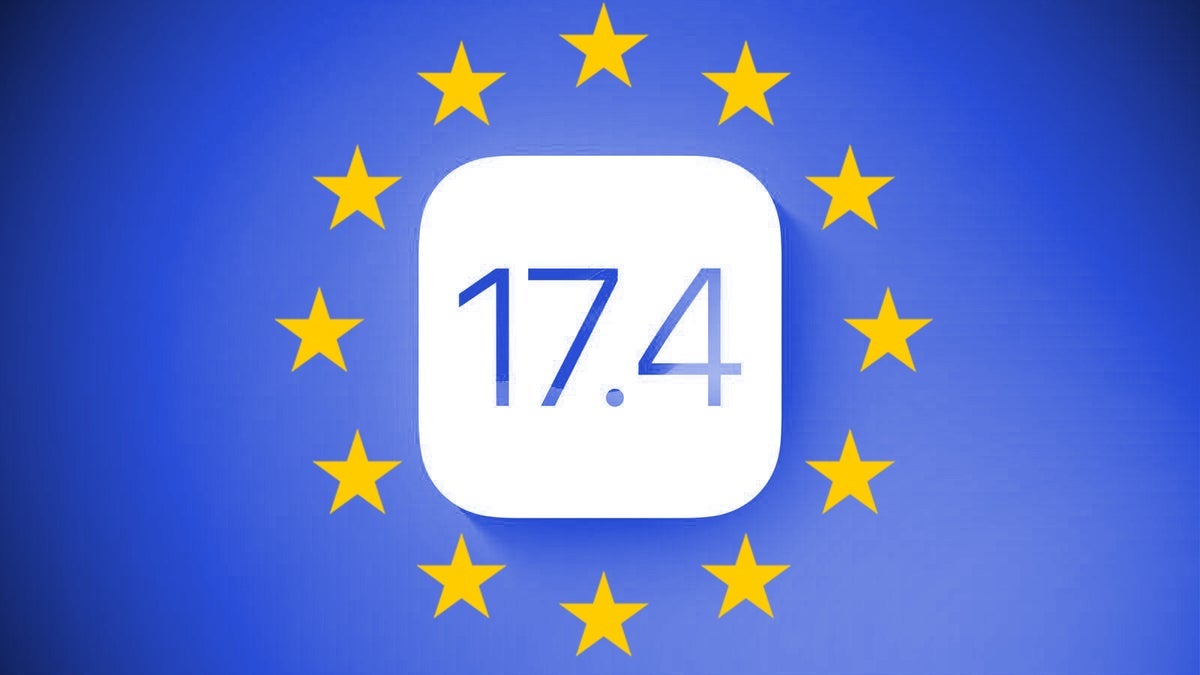
On the face of it, you would think that companies like Epic and Spotify, both long-time critics of the "Apple Tax," would be happy to hear about the changes being forced on Apple in the 27 EU member countries thanks to the Digital Markets Act (DMA). The DMA is forcing Apple to allow apps to be installed from alternate app stores and iPhone users can use third-party browsers powered by non-WebKit browser engines.
Apple did make some changes to the "Apple Tax," reducing the range of the commission that Apple takes on processing in-app transactions from 15%-30% to 10%-17%. And Apple is even giving developers the opportunity to present to subscribers an alternative payment option that bypasses Apple's in-app payment platform. Apple gets no cut at all of the in-app transactions using one of these alternative payment platforms.
However, those developers seeking to avoid the "Apple Tax" will have to pay Apple a "Core Technology Fee" that amounts to half a Euro for each annual install of a particular app after 1 million downloads are reached. This does not make Epic and Spotify happy. Per The Verge, the two firms, along with 32 more companies and alliances, wrote a letter to the European Commission (EC) stating that Apple is "making a mockery of the DMA and the considerable efforts by the European Commission and EU institutions to make digital markets competitive."
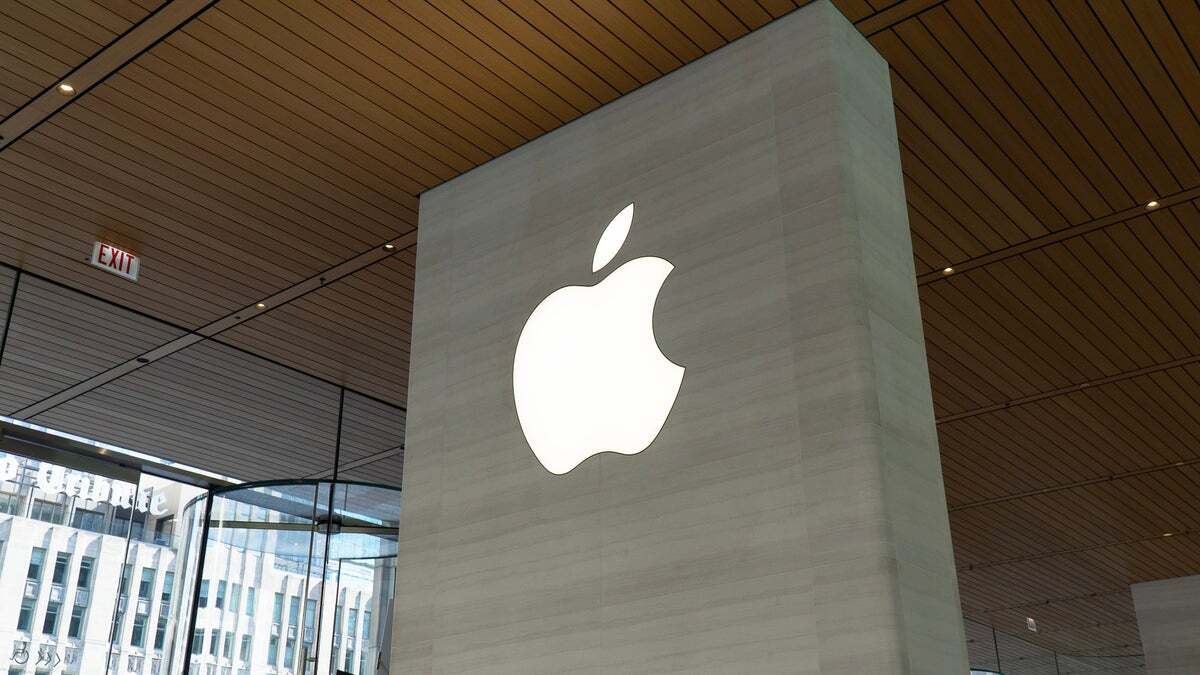
App Store app developers have two choices when it comes to in-app payments in the EU. They can stick with the status quo and pay Apple 10%-17% of in-app transactions, or offer subscribers an alternative payment platform but pay half a Euro fee for each annual install above 1 million for each of their apps. This has the companies and alliances writing in their letter that "Neither option is DMA compliant and both options would simply consolidate Apple's stronghold over digital markets."
The letter adds, "The new fee structure in the proposed new terms seems designed to maintain and even amplify Apple's exploitation of its dominance over app developers. With a hefty transaction fee and a Core Technology Fee (CTF), few app developers will agree to these unjust terms. These fees will deter app developers from providing seamless in-app experiences for consumers, and will hamper fair competition with potential alternative payment providers."
The missive also notes that "Apple's new terms will erect new barriers and reinforce Apple's stronghold over the iPhone ecosystem." The companies signing the letter to the EC say that unless Apple makes some changes, they demand "swift, timely and decisive action against Apple, to protect developers and benefit consumers and do so as soon as the DMA obligations apply. This is the only way to guarantee the DMA remains both credible and delivers competitive digital markets."
The changes take effect with the release of iOS 17.4 although the deadline imposed by the EU is March 6th. The EC will hold an Apple workshop on March 18th where feedback on Apple's DMA compliance can be discussed.
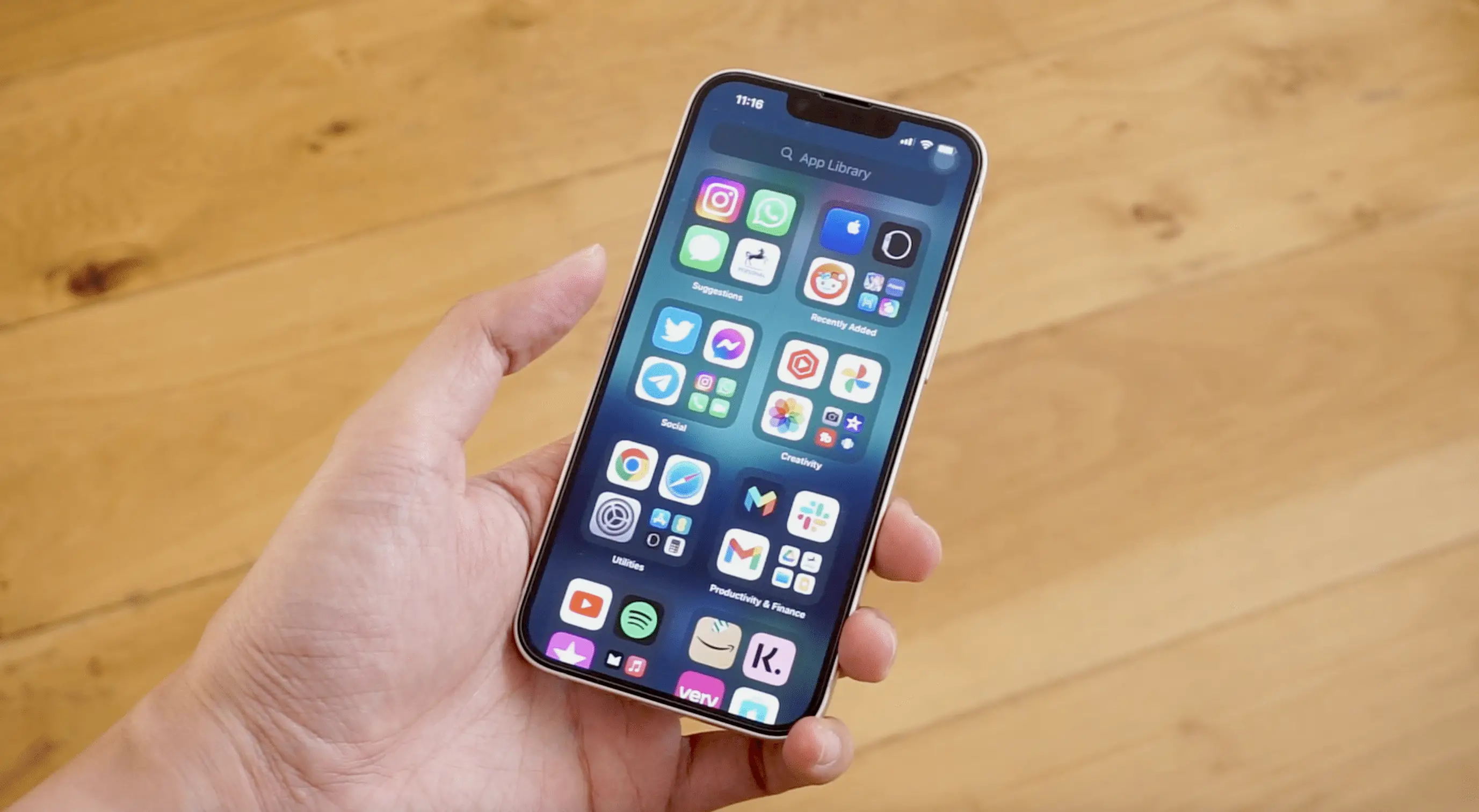
One advantage to Apple's walled garden approach is that it keeps everything tightly controlled. This means that they have greater control over apps and what kind of data these apps can access. This can cut down on potential abuse. But there is no such thing as a perfect system. According to a recent security report, Apple's Shortcuts feature has a privacy issue.
The folks over at Bitdefender have recently discovered a vulnerability in Apple's Shortcuts. Shortcuts is a feature that is bundled with iOS and macOS. It is a native Apple feature that allows users to create automated tasks, such as automatically setting your phone to low power mode when it hits a certain percentage.
From what they found, this vulnerability would allow Shortcuts to bypass Apple's TCC. This is a security framework in iOS and macOS that controls access to sensitive user data from apps. This vulnerability essentially allows a Shortcut to bypass that request and collect sensitive data from an iPhone or Mac computer, which is then exploited at a later date.
This is particularly problematic because of the fact that Shortcuts can be created by users and then shared with the public. This allows users who might not be as tech savvy to enjoy certain automated workflows that were created by others. But this also means that users might end up installing a Shortcuts with the vulnerability and expose their devices.
Thankfully, Bitdefender says that Apple has since patched the issue in iOS 17.3, iPadOS 17.3, and macOS Sonoma 14.3. If you haven't updated your software yet, you probably should, especially if you Apple's Shortcuts and want to avoid privacy issues.
© 2023 YouMobile Inc. All rights reserved





